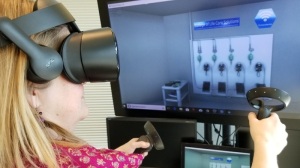por
John R. Fischer, Senior Reporter | June 05, 2018

GE aims to make up for the
expected loss of experienced HTMs
available for training with its
new VR technology
A quarter of HTM professionals are predicted to retire within the next 10 years, leaving the next generation with fewer experienced guides to train them on safety, efficiency and affordability issues associated with medical device usage and maintenance.
GE Healthcare may have a solution to this conundrum in the form of its new virtual reality technology, a computerized training program which made its debut this weekend at the AAMI 2018 Conference and Expo in Long Beach, California.
“As organizations expand and consolidation takes place, there’s a need for HTMs to do more with less. There’s a need for a constant investment in people,” Aaron Goryl, GM, HTM and on-demand development at GE Healthcare, told HCB News. “You have this new generation of engineers coming into the marketplace that need to build expertise quickly and is very accustomed to, and proficient in, utilizing technology and training.”



Ad Statistics
Times Displayed: 68650
Times Visited: 2236 Ampronix, a Top Master Distributor for Sony Medical, provides Sales, Service & Exchanges for Sony Surgical Displays, Printers, & More. Rely on Us for Expert Support Tailored to Your Needs. Email info@ampronix.com or Call 949-273-8000 for Premier Pricing.
Focusing in its initial release on telemetry training for patient vital sign monitoring, the solution consists of goggles and a remote control that places users inside a virtual setting customized to look like an individual provider’s telemetry space.
The imagery projected is composed through a combination of photographs and CAD images, while the remote enables users to perform actions in scenarios modeled after real-world ones that teach them how to maintain and troubleshoot systems at their work site and under the guidance of a GE trainor.
This eliminates the need to travel to training facilities, saving on transportation costs as well as expenses for such training programs. It also promotes engagement and morale by allowing engineers to stay close to their families and not have to travel on weekends.
In addition, mistakes can be made and learned from in a safe, low-risk environment that can be customized when and where the provider needs it.
“We would like them to access the content at their point of need,” Rick Sidlo, education manager of technical training at GE Healthcare, told HCB News. “I think as it becomes more and more relevant to this market, they will feel more comfortable using it. I think there will become more and more content for them to use. We do plan on their having the latest and greatest material.”
Goryl says that the use of this technology will also help in standardizing maintenance and repairs in cost-effective fashions.
“Standardization is important to an HTM, and the solution standardizes the tools, types of training and skill sets that engineers need to reduce tremendous amounts of cost. When you look at this technology, it’s just another way to bring this cost down, because they’re not sending engineers to facilities like ours in Milwaukee for training. We’re actually sending the technology with our trainer to the customer site. The ongoing total cost of ownership can be reduced through this technology.”
Plans for training on other HTM uses cases are currently under consideration for development.

